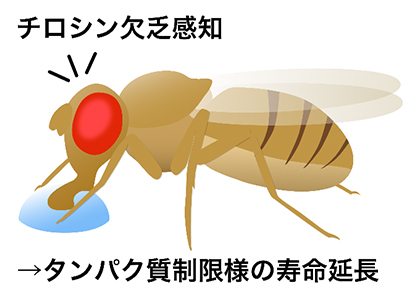A research team from RIKEN has discovered through experiments using fruit flies that restricting the intake of tyrosine, a non-essential amino acid, contributes to extending the lifespan of the individual. This research deepens our understanding of the role of nutrients and may contribute to the future extension of healthy lifespans.

The Unexpected Role of Non-Essential Amino Acids
The Nutrient Response Research Team at the RIKEN Center for Biosystems Dynamics Research analyzed how 10 types of non-essential amino acids affect the health and lifespan of individuals using fruit flies as a model. The study revealed that a deficiency in tyrosine, in particular, is associated with lifespan extension.
The research team fed fruit flies a synthetic diet lacking one of the 10 non-essential amino acids and closely examined changes in lifespan and metabolism. As a result, it was confirmed that the flies’ lifespan was extended when they were fed a diet without tyrosine. This phenomenon suggests that nutritional signaling is regulated by tyrosine, influencing appetite, reproductive ability, and individual lifespan.
Moreover, it was found that the biosynthesis and consumption of tyrosine vary depending on its intake levels within the body. These findings could contribute not only to fundamental research in nutrition but also to future efforts to extend healthy lifespans through nutritional interventions.
In recent years, it has been reported that restricting the intake of proteins or specific amino acids can extend healthy lifespans in various animals. However, the impact of non-essential amino acids on lifespan had not been sufficiently studied. This research suggests that tyrosine may extend lifespan in a manner similar to the overall restriction of protein intake.
Interestingly, the lifespan-extending effects of tyrosine restriction were found to be highly dependent on individual circumstances. For example, when phenylalanine, a precursor of tyrosine, was abundant, or in females with impaired egg-laying ability, the lifespan extension effects were minimal. This indicates that the effects of tyrosine restriction depend on factors such as the amount of amino acids used, biosynthesis, and sex.
Additionally, the study suggests that restricting non-essential amino acids may affect individual physiology through mechanisms different from those involving essential amino acids. While this experiment was conducted using adult female fruit flies, future research applying these findings to other animals and humans is anticipated.
RIKEN’s research offers a new perspective on nutrition and aging studies, and it is expected that adjusting nutrient intake could become a novel approach for extending healthy lifespans in the future.
Press Release Available Here
